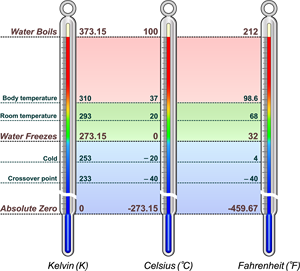
PUMPA - SMART LEARNING
எங்கள் ஆசிரியர்களுடன் 1-ஆன்-1 ஆலோசனை நேரத்தைப் பெறுங்கள். டாப்பர் ஆவதற்கு நாங்கள் பயிற்சி அளிப்போம்
Book Free DemoTemperature Scales:
Thermometers measure the temperature according to well-defined measurement scales, which uses pre-defined reference points to help compare quantities.
Nowadays, Kelvin, Celsius and Fahrenheit scales are the three commonly used temperature scales.
The temperature scale can be formulated by identifying two easily reproducible temperatures. The freezing and boiling point temperatures of water at standard atmospheric pressure are generally used as reference temperatures.
Kelvin scale:
The Kelvin scale is the temperature generally used in science. It is an absolute temperature scale defined as 0K at the lowest possible temperature, called absolute zero. The temperature unit on this scale is the Kelvin, abbreviated as K.
Celsius scale:
The Celsius scale (which replaced the slightly different centigrade scale) has a freezing point of water 0ºC and a boiling point of 100ºC. The temperature unit on this scale is the degree Celsius (ºC).
Fahrenheit scale:
The Fahrenheit scale (most frequently used in the United States) has a freezing point of water is 32ºF, and boiling point is 212ºF. The temperature unit on this scale is the degree Fahrenheit(ºF).
The Fahrenheit scale (most frequently used in the United States) has a freezing point of water is 32ºF, and boiling point is 212ºF. The temperature unit on this scale is the degree Fahrenheit(ºF).

Temperature scales
The equivalence between principal temperature scales is given in the below table.
Temperature | Kelvin Scale (K) | Celsius Scale (ºC) | Fahrenheit Scale (ºF) |
| Absolute Zero | 0 | -273.15 | -459.67 |
| Boiling point of water | 373.15 | 100 | 212 |
| Freezing point of water | 273.15 | 0 | 32 |
| Mean temperature of human body | 310.15 | 37 | 98.6 |
| Room temperature (average) | 296.15 | 23 | 72 |